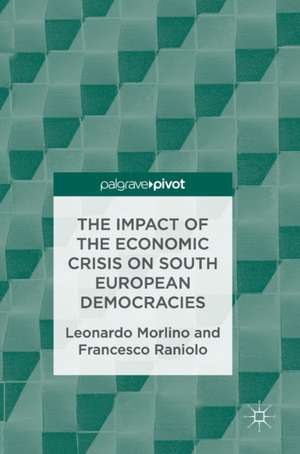The Impact of the Economic Crisis on South European Democracies
Autor Leonardo Morlino, Francesco Ranioloen Limba Engleză Hardback – 10 apr 2017
| Toate formatele și edițiile | Preț | Express |
|---|---|---|
| Paperback (1) | 411.93 lei 6-8 săpt. | |
| Springer International Publishing – 21 iul 2018 | 411.93 lei 6-8 săpt. | |
| Hardback (1) | 418.07 lei 6-8 săpt. | |
| Springer International Publishing – 10 apr 2017 | 418.07 lei 6-8 săpt. |
Preț: 418.07 lei
Nou
Puncte Express: 627
Preț estimativ în valută:
79.100€ • 83.75$ • 66.19£
79.100€ • 83.75$ • 66.19£
Carte tipărită la comandă
Livrare economică 05-19 aprilie
Preluare comenzi: 021 569.72.76
Specificații
ISBN-13: 9783319523705
ISBN-10: 3319523708
Pagini: 128
Ilustrații: XI, 142 p. 15 illus.
Dimensiuni: 148 x 210 mm
Greutate: 0.34 kg
Ediția:1st ed. 2017
Editura: Springer International Publishing
Colecția Palgrave Macmillan
Locul publicării:Cham, Switzerland
ISBN-10: 3319523708
Pagini: 128
Ilustrații: XI, 142 p. 15 illus.
Dimensiuni: 148 x 210 mm
Greutate: 0.34 kg
Ediția:1st ed. 2017
Editura: Springer International Publishing
Colecția Palgrave Macmillan
Locul publicării:Cham, Switzerland
Cuprins
1. Introduction.- 2. How to analyze the impact of economic crisis on democracies.- 3. What innovative destruction? Changes of parties and party systems.- 4. The new protest parties.- 5. New patterns in interests and movements.- 6. Conclusions.
Notă biografică
Leonardo Morlino is Professor of Political Science and Director of the International Research Center on Democracies and Democratizations at LUISS Guido Carli, Italy. He was President of the International Political Science Association (IPSA) (2009-12). He is the author of more than 30 books and over 200 journal articles and book chapters.
Francesco Raniolo is Professor of Political Science and Comparative politics at the University of Calabria, Italy, where he is also Director of the Department of Political and Social Sciences. His main research interests include the political parties, political participation and the quality of democracy, and he has published extensively on these topics.
Francesco Raniolo is Professor of Political Science and Comparative politics at the University of Calabria, Italy, where he is also Director of the Department of Political and Social Sciences. His main research interests include the political parties, political participation and the quality of democracy, and he has published extensively on these topics.
Textul de pe ultima copertă
This book questions whether and to what extent a conjunctural phenomenon such as an economic crisis can bring about lasting political consequences. It focuses on the parties and party systems of four South European countries (Portugal, Spain, Italy, and Greece) between 2008-15. The authors also consider how elections, protests, and interests are affected by the crisis in these four democracies, before assessing how to define the impact of the economic crisis on political participation and competition. In this vein the book analyzes relevant aspects of party systems, the notion of neo-populism as a key to understanding new actors of South European policy, and interest intermediation as a factor of weakness in managing the crisis. Finally, the authors summarize the empirical results emerging from the research: the partial reshaping of cleavages as well as the relevance of the establishment vs. anti-establishment cleavage for the emergence and success of neo-populist parties. The bookwill be of use to students and scholars interested in South European politics, comparative politics, and democracies.
Caracteristici
Contributes to the growing comparative literature on fiscal crisis, populism and party system change Uniquely focuses on the effects of the financial crisis on Southern European democracies and party systems Addresses the timely topic of rise of populism and new protest parties in South Europe
